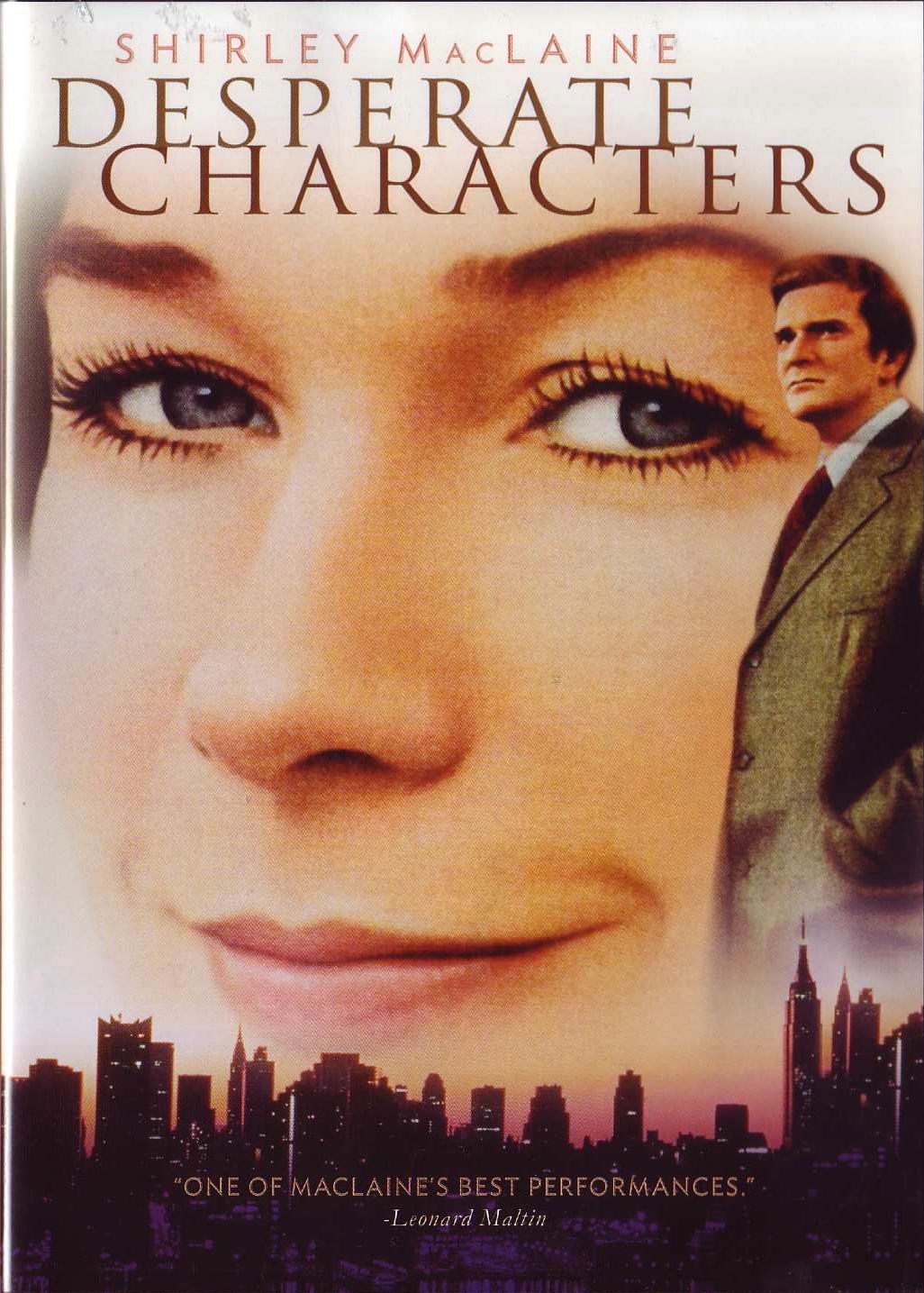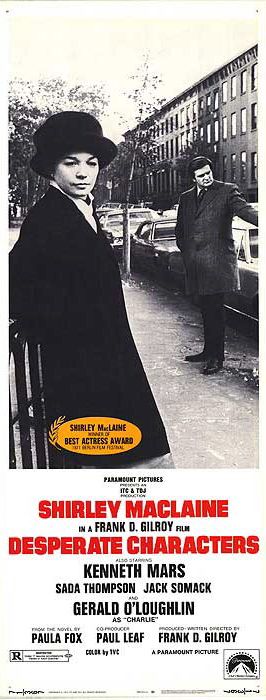| Release List | Reviews | Price Search | Shop | Newsletter | Forum | DVD Giveaways | Blu-Ray/ HD DVD | Advertise |
| Reviews & Columns |
|
Reviews DVD TV on DVD Blu-ray International DVDs Theatrical Reviews by Studio Video Games Features Collector Series DVDs Easter Egg Database Interviews DVD Talk TV DVD Talk Radio Feature Articles Columns Anime Talk DVD Savant HD Talk Horror DVDs Silent DVD
|
DVD Talk Forum |
|
|
| Resources |
|
DVD Price Search Customer Service #'s RCE Info Links |
|
Columns
|
 |
Desperate Characters |

|
Desperate Characters Legend Films 1971 / Color / 1:78 anamorphic widescreen / 88 min. / Street Date , 2008 / Starring Shirley MacLaine, Kenneth Mars, Sada Thompson, Jack Somack, Gerald S. O'Loughlin, Chris Gampel, Mary Alan Hokanson, Michael Higgins Cinematography Urs Furrer Production Design Art Direction Edgar Lansbury Film Editor Robert Q Lovell Original Music Ron Carter, James Hall, Lee Konitz Written by Frank D. Gilroy from a novel by Paula Fox Produced by Frank D. Gilroy, Paul Leaf Directed by Frank. D Gilroy |
The filmic freedom of the early 1970s, with the demise of the production code and the breakdown of the incestuous studio system, resulted in many great movies but also a number of very strange shows that simply didn't connect with audiences. Viewers in major markets may have noticed certain titles zipping in and out of theaters too fast to catch, items as varied as T.R. Baskin, The Lolly-Madonna War, Hammersmith Is Out and The Angel Levine. Genre pictures like The Valley of Gwangi and No Blade of Grass probably fit into this blink-and-you-missed-it category as well. Most of us never got a chance to find out if they were unfairly discarded or rightly shunned.
Desperate Characters stars Shirley MacLaine and is written and directed by Frank D. Gilroy, the TV scribe and playwright of the Pulitzer Prize winner The Subject Was Roses. He also wrote and directed the wonderfully thought out but poorly executed From Noon 'Til Three. Roses was warmly received despite its relentless pessimism. Dysfunctional families were cultural news in 1968, and audiences were gratified to see actress Patricia Neal acting again after recovering from a series of catastrophic strokes.
In Desperate Characters the misery is relentless. Shirley MacLaine plays the part of an emotionally brutalized woman reeling from the casual cruelties of a New York City interpreted as an outer circle of Hell. Gilroy populates the picture with a dozen excellent and unfamiliar stage actors, but the film is a real downer, an intelligent but unrewarding slice of despair. The well-crafted curiosity was a theater owner's worst nightmare, a picture that inspires mass walkouts.
Frankly, that fact alone should be reason enough to see it.
Jack Valenti's new rating system saw a number of satires bemoaning the collapse of living conditions in big cities. The Out-Of-Towners was an unfunny comedy about tourists brought low by dozens of petty indignities, and the anarchic Little Murders tried to make a black comedy out of dog dirt on the sidewalks and families that release their anxieties by shooting pedestrians from their windows. Neil Simon and Jules Feiffer had widely diverging aims but the result was the same -- audiences came out of their movies more disturbed than when they went in.

The image of a smiling Shirley MacLaine on the cover of this DVD must come from some universe other than that of Desperate Characters; the original poster was a grainy B&W photo of two isolated figures on a sidewalk. Writer-director Frank Gilroy seems to be reaching for a cosmic notion of human misery. Sophie Bentwood is a fairly affluent New Yorker who won't automatically elicit sympathy. But ugly social pressures brought on by the breakup of her insensitive husband's law partnership have left Sophie alienated and hurt. Every personal encounter leaves Sophie feeling as if she's committed some grave offense, but nobody will tell her what she's done. It's Kafka in Queens.
Much of the narrative repeats the same pattern: hoping for meaningful human contact, meek Sophie puts out a pitiful feeler only to suffer yet another affront to her crumbling spirit. Husband Otto is a closed-off drudge who takes her existence almost totally for granted. Sophie goes on a long walk in the middle of the night with her husband's ex-partner, but he mostly expects her to support his wounded ego. She seeks solace with old friends, and cannot bear the tension when the couple launches into a fight. Many of the situations remind us of the oppressive, soul-crushing cruelties in the stories cof James Joyce's Dubliners. Acquaintances and shopkeepers are intolerably rude, as if Sophie didn't merit simple courtesy. An old friend in the street ignores Sophie friendly greeting, and then exits rolling her eyes, as if Sophie had become a social untouchable.
In an altogether too symbolic development, Sophie reaches out for affection to a neighborhood cat, and gets a nasty scratch for her trouble. For the entire weekend, people remark about the scratch, as if she's some idiot who doesn't know how to care for herself.
It goes without saying that the sun never shines in this part of New York. Nowhere is there to be found a truly sincere human relationship. The Bentwood's cozy row house fronts on a street frequented by derelicts and sleazes, one of which intimidates $20 from Otto with a cheap con game. The crowning indignity arrives when Otto and Sophie discover that their summer place has been ransacked. Otto becomes furious when the duplicitous watchman and the local police claim that the place was intact just the day before, implying that the vandalism is Otto's fault. The already angry Otto takes out his rage on the easiest target around: Sophie. What was meant to be a healing weekend turns brutal when Otto more or less rapes his own wife.
Like Diary of a Mad Housewife, Desperate Characters must be the antithesis of a Date Flick; I can't imagine a marginal relationship surviving the experience of a trip to this picture. Yes, it's emotionally honest and Shirley MacLaine can be proud of her good performance. She gets excellent support from Kenneth Mars (who we're most used to seeing in silly comedies), Sada Thompson, Chris Gampel, Mary Alan Hokanson, Rose Gregorio and the talented Michael Higgins, of Barbara Loden's Wanda and Horton Foote's On Valentine's Day and Courtship. Carol Kane has a brief bit as a rude young woman. This one's for students of quality acting, sociologists and psychiatric specialists. Placed in the hands of someone suffering from depression, it could be a dangerous weapon.
Legend Films presents Desperate Characters in a good but not exceptional transfer that probably reflects the look of the original film. The many dark interiors and dank colors seem designed to smother joy in its cradle; Sophie's attractive house is a claustrophobic trap. The audio is functional and the dialogue clear, and the disc has no extras. Perhaps the movie needed a song, like Judy Collins' haunting Who Knows Where the Time Goes in The Subject Was Roses;, or From Noon Til' Three's darkly pragmatic love ballad Hello and Goodbye by Elmer Bernstein and Alan and Marilyn Bergman. I don't think Ted Nugent's Cat Scratch Fever will do. 1
On a scale of Excellent, Good, Fair, and Poor,
Desperate Characters rates:
Movie: Intense, uncomfortable ... a calculated downer
Video: Very Good
Sound: Very Good
Supplements: none
Packaging: Keep case
Reviewed: May 19, 2008
Footnotes:
1. Note from long time correspondent "B", June 2, 2008: Dear Glenn: Certainly one of the most despairing, depressing, unbearably sad American movies ever made -- this was notable even for 1971, that banner year of downbeat pictures -- Desperate Characters has always stood out in my mind as something terribly underrated. I think I know why. While I encouraged people to go see it back in '71, my honest description of the movie generally guaranteed that anyone I spoke to would choose another picture to see. Few have seen it, and a good number of those who did see it found the experience so sobering and unpleasant that they simply hated it.
Frank D. Gilroy is just good enough, and brave and green enough, not to make the mistakes that more experienced directors might make in approaching this material. His script is solid and spare, and it's a real screenplay, too -- unlike his (well-crafted but still highly theatrical) adaptation of his Broadway Subject Was Roses (directed by Ulu Grosbard), this is a movie all the way. I can't call his direction stylish, but it isn't exactly artless either. As a director, he believes in his characters and actors so utterly, trusts their voices and faces, that we do too. Gilroy actually achieves here some of the directness, simplicity and honesty as a helmer and storyteller that Sidney Lumet is usually (and mistakenly) given credit for.
Thinking back on the movie after all these years, I wonder whether it could have included a little humor, a bit more leavening to make the story slightly more palatable. I generally fault completely humorless films as being unrealistic. But not this time, I think. These are joyless people trapped in pallid situations. They may not be literally facing the end of the world, like the characters in Bergman's Shame, but it isn't that much different to these characters.
Gilroy, truly bitten by the movie bug, went on to write the charmingly conceived From Noon Til Three, which, while worth seeing, was badly victimized by its direction (here Mr. Gilroy's lack of style proved his undoing). He later wrote and directed a few films which he produced independently; simply made and well acted, these were a little better than Noon.
As I noted above, even in the dark days of 1971, Desperate Characters was an unusually depressing motion picture. I recall a friend wondering how an American studio came to produce such a wrenching, despairing work. The answer remains interesting: an American studio didn't produce this film. In 1971, ITC's Lew Grade signed Shirley MacLaine to star in her own television series; the deal was fabulously lucrative for the actress, and included two feature films, purportedly of the actress' own choosing. Well, she chose Desperate Characters as the first picture, and ITC entirely financed the relatively low-budget film. [The other picture was the disappointing The Possession of Joel Delaney, released in the Spring of 1972. The MacLaine television series, expensively shot all over Europe, proved unsuccessful and lasted less than a season.]
While the movie received many favorable and respectful reviews, critic John Simon viciously attacked the film and took great pleasure in trashing the (fine) performance of Kenneth Mars; he was literally offended by the idea that the actor who played Franz Liebkind in The Producers could dare essay such a serious role. [I wish I could find the piece; the frequently irascible critic was completely out of control here.] Mars fired back the best way he could. Already cast as the comic villain in What's Up Doc?, Mars huddled with Peter Bogdanovich and tinkered with the already impossibly rude, annoying character, giving him an obscure Slavic accent and changing his surname to... Simon.
Fine review, but I don't think I'll be renting this soon... Best, Always. -- B
Return
Reviews on the Savant main site have additional credits information and are more likely to be updated and annotated with reader input and graphics.
Review Staff | About DVD Talk | Newsletter Subscribe | Join DVD Talk Forum
Copyright © MH Sub I, LLC dba Internet Brands. | Privacy Policy | Terms of Use
Subscribe to DVDTalk's Newsletters
|
| Release List | Reviews | Price Search | Shop | SUBSCRIBE | Forum | DVD Giveaways | Blu-Ray/ HD DVD | Advertise |





